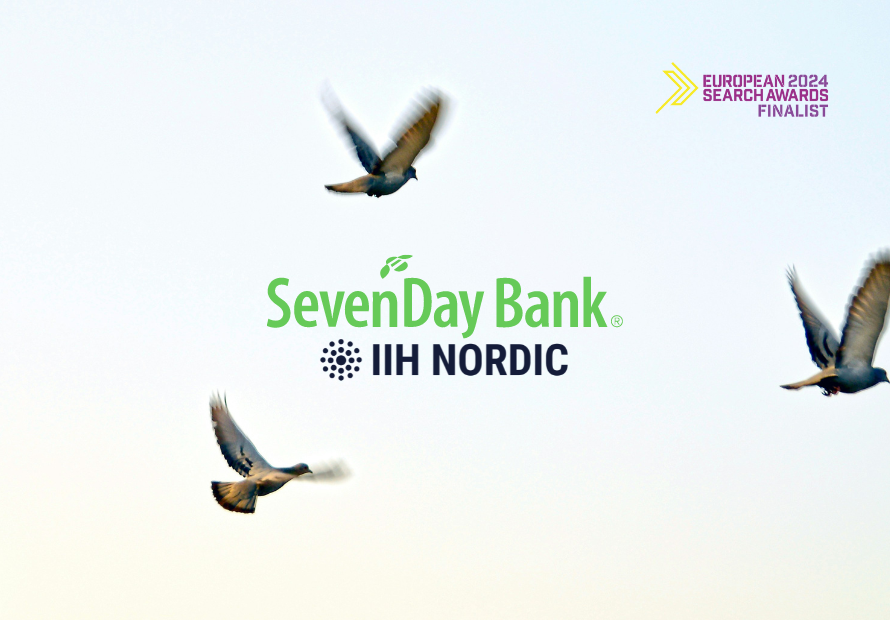SevenDay Bank faced a critical challenge that tested the limits of digital marketing analytics and optimization. The bank, renowned for its straightforward, cost-effective, and easily accessible unsecured loan products in Sweden, encountered significant hurdles in tracking conversions following the transition from Universal Analytics to Google Analytics 4 (GA4). This challenge threatened the core of their online marketing strategy—optimizing for conversions. Faced with this dilemma, they partnered with IIH Nordic and pivoted towards a strategy focused on driving traffic, aiming to enhance the Google Ads Quality Score to secure lower click costs and better search result placements. This case unfolds the journey from facing unforeseen challenges to achieving record-breaking results in a fiercely competitive financial sector.
The results:
- Account quality score of 10
- 19% reduction in CPC
- 10% more website traffic despite reducing spending by 11%
- All-time high in generated loan applications at the lowest ever cost per conversion
Overcoming GA4 challenges
The transition to GA4 brought to light the complexities and limitations of the new analytics platform, leading to a significant gap in conversion tracking capabilities. This gap not only hindered the optimization of conversions but also placed SevenDay Bank at a strategic disadvantage in an industry where precise tracking and targeting are paramount for success. Recognizing the criticality of the situation, they collaborated with IIH Nordic and embarked on a mission to revamp the Google Ads strategy to ensure continued performance and efficiency.
Innovating with traditional Ads tactics
The scene was set: to navigate through these challenges with a clear objective — to enhance the Google Quality Score across the board, thereby maximizing qualified traffic within the allocated budget. This initiative was kick-started with an ambitious goal to elevate the Account Quality Score from 8.6 to 9.6, which was anticipated to reduce the Cost Per Click (CPC) by approximately 15%. The strategy entailed a deep dive into optimizing both branded and generic campaigns, challenging Google’s ad recommendations, and introducing a traditional yet innovative approach to Responsive Search Ads. By focusing on high-quality, keyword-rich ads and disregarding the suggested ‘ad strength’ metric, the aim was to improve Click-Through Rates (CTR) and overall Quality Scores.
New ad versions boost engagement and CTR
Through meticulous ad optimization and strategic testing, an additional ad version to each ad group was introduced, prioritizing engagement and relevance. This approach not only validated the performance hypothesis but also led to a significant uplift in CTR, further enhancing the Quality Score. By reverting to fundamental principles and emphasizing the importance of structured campaign setup, it was possible to navigate around the limitations imposed by the loss of features like smart bidding for conversions.
Record loan applications at lowest CPA
The results of the strategic pivot were nothing short of remarkable. The Account Quality Score soared to 10, surpassing the initial target. This achievement was accompanied by a 19% reduction in CPC and a 10% increase in website traffic, despite an 11% reduction in spending. Furthermore, the year concluded with an all-time high in generated loan applications at the lowest ever cost per conversion, underscoring the value of human expertise in an era increasingly dominated by AI and machine learning.
Human expertise and tech transform digital marketing
This case exemplifies how IIH Nordic, through strategic foresight, technical acumen, and a willingness to challenge conventional norms, led SevenDay Bank from facing a potentially crippling challenge to achieving unprecedented success in their digital marketing efforts. The journey highlights the indispensable value of human expertise in complementing technological advancements, reinforcing the belief that understanding the fundamentals of digital marketing tools like Google Ads can yield exceptional results, even in the absence of cutting-edge technology. This collaboration not only set new benchmarks in the financial services industry but also demonstrated the transformative power of innovative problem-solving and strategic partnership between a bank and its digital agency.







